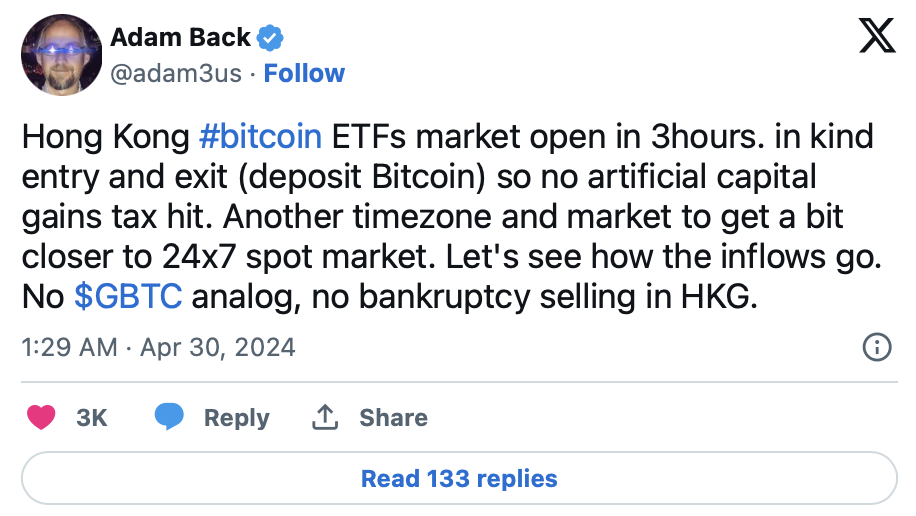Hong Kong has finally launched the much-anticipated spot Bitcoin and Ethereum exchange-traded funds (ETFs), sparking significant expectations among investors. This launch comes at a time when US-based spot Bitcoin ETFs have been seeing notable outflows in recent weeks. Market analysts are emphasizing the differences of the spot Bitcoin ETFs in Hong Kong compared to their US counterparts, while pointing out their advantages.
Hong Kong’s Spot Bitcoin ETFs Take a Leading Step
One distinctive feature of the spot Bitcoin ETFs in Hong Kong is their use of a physical subscription and redemption mechanism. Unlike the cash redemption model used in US spot Bitcoin ETFs, this allows for the exchange of underlying assets with fund units and vice versa.

Blockstream CEO Adam Back highlighted that this feature is particularly important for facilitating market accessibility and creating a more sustainable spot market environment by addressing timing disparities.
Meanwhile, the expectation surrounding capital inflows into Hong Kong’s spot Bitcoin ETF market is quite high, and analysts offer differing perspectives on its potential. Bloomberg Intelligence’s Rebecca Sin predicts that Hong Kong’s spot Bitcoin and Ethereum ETFs could accumulate $1 billion within two years, foreseeing relatively modest entries. Harvest Global CEO Han Tongli considers this projection very conservative, suggesting that much more could be achieved as Hong Kong widely accepts financial products and services appealing to both Eastern and Western markets.
In the meantime, outflows from US-based spot Bitcoin ETFs continued prior to the launch of the spot Bitcoin and Ethereum ETFs in Hong Kong. According to data from Farside Investors, there was a net outflow of $51.5 million from US spot Bitcoin ETFs on April 29.
Competition Intensifies in the Spot Cryptocurrency ETF Market
According to VanEck Digital Assets Strategy Director Gabor Gurbacs, the emergence of spot Bitcoin ETFs in Hong Kong indicates an increase in competition within the East-West spot Bitcoin and Ethereum ETF market.
Gurbacs suggests that China’s involvement in approving these ETFs reflects its strategic intent to compete in institutional Bitcoin capabilities. Speculations exist about China’s broader interests, potentially extending beyond ETFs to include technology, market infrastructure, and spot Bitcoin.
Overall, the launch of spot ETFs in Hong Kong not only legitimizes Bitcoin within traditional financial frameworks but also signifies broader acceptance and participation in the cryptocurrency market.

 Türkçe
Türkçe Español
Español








